- Home
- Catherine Jinks
The Secret Familiar Page 2
The Secret Familiar Read online
Page 2
I even received a blanket—for the mur was very cold. Fires are not encouraged there, and the thick stone walls are always damp. Bitter draughts penetrate them through every chink and arrow slit. Though circumscribed by no shackles or prohibitions, I found myself crouched in one spot, wrapped in my greasy blanket and blowing clouds of vapour into the fetid air. Like my fellow inmates, I sought out other warm bodies to huddle against. For solitude is not a favourable condition, if one’s blood has turned to ice.
This is how I became acquainted with my first Beguin.
I have shared many cold nights with many frightened heretics. But in the past they were always Cathars, and had been hunted all their lives. Heresy is in the bloodline of most Cathars; they are raised from birth to regard priests as their enemies, and the Church as Hell’s Gate. They are weaned on stories of martyrdom. So although they might be arrogant, they are also resigned. There is hardly a trace of reckless courage among them. The time for that is long gone, for the heresy is an ancient one, with deep roots in my country.
The Beguins are different—or so I deduced from the one I met. As we shivered together in a frigid stairwell, we began to exchange a few words. He gave me his name, and I gave him my alias. He was called Pons, and he talked incessantly. I thought him foolish beyond belief, for he knew nothing about me or my intentions. (For all he knew, I could have been a spy, planted there to learn his secrets.) But he was passionate, and frightened, and accustomed to declaiming; perhaps he wanted to distract himself from his miseries.
Whatever the cause, he furnished me with fresh news about the current heresy trial—which happens to be his own. Though such trials are normally held in secret, the events of this particular one are becoming well known in certain circles, owing to a bitter dispute that has arisen between the judges. Pons described it to me in detail. Apparently, he and several companions have been charged with spreading the doctrine that Christ and His Apostles owned no possessions, either separately or in common. Jean de Beaune has condemned this view as heretical. But one of the experts assembled to pass judgement on the captured Beguins—a lector at the Franciscan priory here in Narbonne—has begged to differ. He has declared that, far from being doubtful, such a belief was defined as orthodox in the decretal Exiit qui seminat.
‘Now he has been ordered to recant by that devil, Jean de Beaune,’ Pons lamented. ‘Even though the truth of his position is manifest! It is beyond belief.’
‘Perhaps,’ I replied, though it all made perfect sense to me. I know little about the Beguin heresy, but a man would have to be blind and deaf not to have realised that Christ’s poverty is now a subject to be avoided in public. Only three years ago, four Franciscan monks were burned at Marseilles for adhering too staunchly to their belief in holy poverty. Since then, three people have burned in Narbonne for much the same reason.
One can only assume that Jean de Beaune was planning some mischief by appointing a Franciscan to his judicial assembly. For there are many Franciscans who still nurse a fond regard for evangelical destitution, despite the Pope’s unsympathetic stance. And what better way to sniff out a heretic than to have him condemn himself, on record, with his own tongue?
‘Your Franciscan is a brave man,’ I remarked tactfully. Whereupon I was treated to a harangue on the subject of honest Christians, and lying followers of the Antichrist, and why the monks of St Dominic are suckling at the teats of the Whore of Babylon. Once upon a time, I would have taken careful note of every word spoken, so that I might repeat them in a sworn statement. But Pons was a lucky man. Most of what he said I disregarded. In fact I drifted off to sleep while he was still rambling on about the Rule of St Francis, and how it is the same as the Gospel of Christ.
Hours later, I awoke to find that it was dark. Even Pons had fallen asleep by then. A mur at night is a dismal place, for every sigh and sob and groan is clearly audible in the silence. I remembered how once, long ago, I used to struggle with my rising sense of panic as I lay in the murus largus of Toulouse, imagining a tide of rats approaching me through the darkness. That was before my master’s arrival, of course. But the memory did not make my night in the tower any more enjoyable.
In the morning it occurred to me that I was getting too old for prison. When I was younger, I never suffered from stiff limbs or aching joints, no matter how uncomfortably I was housed. During the last five years, however, I have grown accustomed to soft beds and good food. I have lost my endurance.
On reflection, I should perhaps make some attempt to strengthen my sinews again. Now that Jean de Beaune has found me out.
With regard to Jean de Beaune, he came that afternoon, just after nones. The bells were ringing at St-Sebastien when I was brought to the guard room. There I waited for some time, alone, quietly surveying the nutshells, fruit stones, old boots, piles of rags, empty casks and bits of broken furniture with which the gaoler’s staff choose to surround themselves. I was beginning to wonder if I, too, had been left to moulder away like an apple core when Jean de Beaune suddenly appeared, accompanied by the selfsame nuncio who had fetched me the day before.
The Dominican arrived like a blast of wind, banging the door and sending discarded husks and straws whirling into the air. He is a very short man. Even I am taller, and my modest height has always worked to my advantage, since it is hard to see me as a threat. Imagine my surprise when I rose to find myself looking down at Jean de Beaune, who seems to be furnished with a short man’s temper. He glowered at me, then looked around with a growing dissatisfaction that was engraved upon his face in many sharp lines.
‘What is this?’ he demanded of the nuncio. ‘This is not suitable! Bring the gaoler. Now.’
‘The gaoler?’ said the Catalan. ‘But—’
‘Now!’
‘Before you do . . .’ I interrupted, and such was the shock occasioned by my daring that I was able to submit my letter without hindrance. ‘Before you do, Father, you may want to read this.’
‘Read what?’ snapped Jean de Beaune, reaching out. ‘What is it?’
As I surrendered the document, I pointed to its seal. Whereat the Dominican frowned and narrowed his eyes. They were small, bloodshot eyes, set a little too close together, but when he turned them on me I saw that they were not lacking in penetration.
He studied me for a moment, after which careful examination he scanned the letter with growing surprise. I watched his high colour fade, and his hostile, ill-natured expression yield to one far more open and intelligent. Suddenly he addressed the nuncio.
‘Get out,’ he said. ‘Wait for me outside.’
‘Father, are you sure?’ The Catalan eyed me with suspicion. ‘He may have a knife.’
‘Are you deaf? I said go!’ barked Jean de Beaune. Whereupon the nuncio withdrew in sullen obedience, closing the door behind him.
There was a long silence after he had gone. Jean de Beaune read the letter through once more, as if reluctant to trust his own vision. He peered very closely at my master’s name, scrawled across the bottom of the parchment. He studied the seal again, chewing his bottom lip. At last he said: ‘I know Bernard Gui. I know his script.’
I thought it better not to speak.
‘Are you literate?’ he went on. ‘Can you read Latin?’
‘Not Latin. No, Father,’ I replied.
‘So you know not what is written here?’
‘Father Bernard told me. I was his servant for many years. He was afraid that my past might catch up with me, despite all my precautions. So he gave me this letter.’ I nodded at the page in Jean de Beaune’s hand. ‘You see that he was right. My past has caught up with me.’
‘Your name was mentioned by a heretic named Armand Sanche,’ said the Dominican. ‘Are you acquainted with him?’
‘Yes.’
‘He was captured near Quié last month, and brought to Carcassonne. He said that you were once a follower of Pierre Autier.’
I inclined my head, thinking: Armand Sanche. That fool.
I
t was as I had suspected.
‘I did follow Pierre Autier,’ was my response. ‘I followed him all the way to Belpech. Where I had him arrested.’
‘So you were not a true disciple?’
‘No, Father.’
‘It would be hard to believe, without this letter.’
‘Yes.’
‘You are a faithful son of the Holy Roman Church? You believe that the bread and wine in the mass performed by the priests is changed into the body and blood of Christ by divine virtue?’
‘Yes, Father.’
He chewed his lip again, very pensive. I could see that he was torn. There is nothing an inquisitor enjoys less than abandoning a fresh trail. On the other hand, he could not deny the letter. He knew my master’s writing. He knew my master’s seal.
He could not imprison me without offending my master.
‘This is your real name?’ he said abruptly, flicking the parchment with one finger. ‘Helié Bernier of Verdun-en-Lauragais?’
‘It is.’
‘Yet you call yourself Seguier.’
‘I have betrayed many heretics, Father. And there are some who know it, despite all my efforts. I could not stay in the mountains, or in the Toulousain. I had to come here, and pretend to be someone else.’
‘If I were to ask Bernard Gui about Helié Bernier, what would he say?’
This was a clever and interesting question. It caused me to regard Jean de Beaune with more respect than I had felt hitherto.
It was the sort of question my master might have formulated.
‘If you were to ask Father Bernard about Helié Bernier,’ I replied, imagining my master’s face and voice, ‘he might perhaps say, “Why should you want to know such a thing?”’
I delivered this last remark in exactly my master’s way, very mildly, with a blank face and a piercing look. By this means, I convinced Jean de Beaune. He blinked three times, and his breath caught in his throat for an instant.
‘Ah—yes,’ he said. ‘I see. Yes.’
We regarded each other for another long stretch of time. Then, slowly and reluctantly, he relinquished the letter. I tucked it back into my clothes as he pursed his lips.
‘You should not stir from this city until I have made inquiries of Bernard Gui,’ he declared. ‘I shall have you watched, be warned. You will not escape me.’
‘No, Father.’
‘You may have deceived the heretics, but you will not deceive the Holy Roman Church. Nor her loyal and devoted servants.’
I nodded, and Jean de Beaune seemed satisfied. He summoned the nuncio, who was ordered to release me. Then I was ejected onto the street—where I stood dazed for a moment in the noise and sunshine.
On my way home, I had to devise a convincing story. It was not difficult. In the mountains, I would have been hard pressed to explain away such a brief sojourn in the custody of an inquisitor. For after generations of betrayal, the men of the Pyrenees are highly suspicious. They know that an early release is generally bought at a price.
But the people of Narbonne are not so well acquainted with inquisitors and their habits. My tenants and neighbours seem content to believe that the whole affair was a case of mistaken identity. A Helié Seguet had been sought, and a Helié Seguier found: that, at least, is what I told them. And they appear to have accepted it, though they will not remain so complacent if I am too frequently and obviously watched.
God grant that Jean de Beaune receives confirmation of my claim very quickly. God grant also that Bernard Gui leaves me in peace. For I would rather not see him again.
He is my master, and a great man. Yet I would have preferred to escape his notice. ‘Hide yourself,’ he told me, and I obeyed—perhaps too well. No inquisitor likes to be outwitted.
I just want to be left alone. Is that too much to ask, after so many years of faithful service?
III.
Shrove Tuesday
I should have known when the order came. Normally it arrives every two months: a regular delivery of split-skin quires for the Dominican priory (one score). On this occasion, barely three weeks had elapsed since the last order. And it was for ten quires only.
I should have realised.
My suspicions were misdirected. I had been watching the street, as usual. I had been keeping alert when on my rounds, checking for patterns, putting names to faces, keeping clear of alleys. On my way to La Moyale, with my delivery of parchment, I doubled back twice before I reached the Old Bridge, and repeated this ploy in the Bourg, between Grain Square and the Lamourguier Gate. My mistake was to search for a concealed threat. After waiting five years for an unexpected attack, launched from behind, I was ill prepared to defend myself against a frontal assault.
I took the delivery myself, of course. Martin is too young to carry valuable loads beyond the walls of the Cité; I would be afraid for him, and for his parcel, were he to attempt it. By this time I knew that I would not be stopped at any of the city gates—that Jean de Beaune’s threat had been an empty one. Had he truly been watching me, I would not have been permitted to set foot outside the walls of Narbonne. But I had done so on at least three occasions since our meeting, and for this reason, perhaps, was not as cautious as I should have been upon approaching the Dominican priory. Stupidly, I had begun to discount Jean de Beune. He seemed less dangerous to me than the unknown, unseen assailants who had haunted my dreams for years.
I left home shortly before midday, encountering few people after I had passed through the Lamourguier Gate and turned left towards the river. I saw four peasants ploughing. I saw two Dominicans—a preaching pair—deep in conversation as they headed for the Bourg. And I saw a dyer, whose hands were stained yellow with weld. This man I appraised cautiously, because he looked out of place. But then I noticed the boy with him, and realised that the dyer was almost certainly standing in his own vineyard, instructing his heir as to its management.
It was well before compline when I reached the priory, so there were no crowds milling about the door of the church—as there would have been at the start of the daily service. But I would not have been obliged to struggle through these crowds in any case, for the church was not my destination. Instead I knocked at the small portal that opens onto the cloister, its gardens and its offices. Then I waited, as I am always obliged to wait. For the Dominican priory (unlike its Franciscan counterpart across the river) is very difficult to penetrate.
The Franciscans have nothing like such high walls, nor such a dour porter to guard their seclusion. It is my custom to deliver my goods into the hands of the porter at the priory entrance, and I have never met with such morose discourtesy anywhere else. Admittedly, lay brothers are often prone to states of profound dissatisfaction, owing to their inferior status in the hierarchy of the church. Being low-born and poorly educated, they are sometimes treated with disdain by the clerics they serve, and have no means of improving their position. Nevertheless, it is rare to encounter a man so manifestly discontented with his lot as that Dominican porter—whose sour expression must have been carefully selected to repel frivolous inquiry. As a general rule he will scowl at my offering, snatch at my parcel, and slam the door in my face. If a word of any kind happens to pass his lips, I can count myself lucky indeed.
Imagine my surprise, therefore, when I was greeted today with a gesture of invitation.
‘You are the parchment-maker?’ he growled, in his thick and rasping voice. ‘Helié Seguier?’
‘I am. Yes.’
‘Then you may come in.’
He stepped back. I gaped. Impatiently, he flapped his beefy hand.
‘Come!’ he insisted.
Even as I crossed the threshold, I knew that I was in error. Something was wrong. Jean de Beaune’s voice flashed through my head; I looked for him nervously while attempting to keep up with the porter, who shuffled along, large and slope-shouldered, just ahead of me. In complete silence we skirted the kitchen garden, which had been sown with the spring crops, and plunged into a serie
s of stone passages that linked dorter to kitchen to library. The arrangement of the buildings was almost identical to that employed in the priory at Toulouse. Even the smell was similar: a faintly sweet smell of herbs, incense and old books. The friars in their black-and-white robes could have been their brothers in Toulouse, transplanted. They moved about just as swiftly and silently, turning their faces in exactly the same way.
But none was Jean de Beaune. And none paid me the slightest attention until after I was ushered into a small whitewashed room lit by an open window. The porter then bade me sit on one of the wooden benches that lined the walls, and promptly withdrew. I heard his dragging footsteps growing fainter in the passage outside.
Clutching my quires of vellum, I waited fearfully. The silence was absolute. It occurred to me that I had waited in a small room not long before (albeit a darker, messier room) and I became more and more convinced that I was awaiting the same man on this second occasion. Jean de Beaune was back, I decided. Jean de Beaune had drawn me into his web.
After a while, the quiet padding of brisk, leather-clad feet became audible—as did the swish of long woollen robes. I recognised the sound of a monk in a hurry. Nothing prepared me, however, for the man who entered. I had been anticipating Jean de Beaune. His face was in the forefront of my mind.
Instead, I found myself staring at Bernard Gui.
‘Helié, my dear son,’ he said. ‘What a long, long time it has been.’
I shall never forget the moment I first laid eyes on my master, in the mur of Toulouse. I was perhaps sixteen years old, small and thin and chained like an ox. My cell was dark and damp, slimy with growth and excretions. I had been starved, beaten and cruelly deserted by my next of kin. Even the last inquisitor had deserted me. He had gone off to Rome, to plead a case against some rich heretic with important friends—and had died in Perugia shortly afterwards, leaving my fate unresolved. I had not been tried. I had not been sentenced. I had been forgotten, it seemed to me. Forgotten even by my uncle and my cousins, who had paid nothing towards my keep in that terrible place. Having lured me into error, they had abandoned me, escaping into the Black Mountains before they, too, could be arrested.

 The Paradise Trap
The Paradise Trap A Very Singular Guild
A Very Singular Guild Eloise
Eloise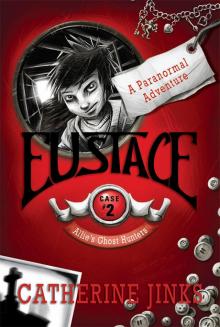 Eustace
Eustace A Very Peculiar Plague
A Very Peculiar Plague Pagan's Crusade
Pagan's Crusade The Gentleman's Garden
The Gentleman's Garden Pagan's Vows
Pagan's Vows A Plague of Bogles
A Plague of Bogles The Secret Familiar
The Secret Familiar Pagan's Daughter
Pagan's Daughter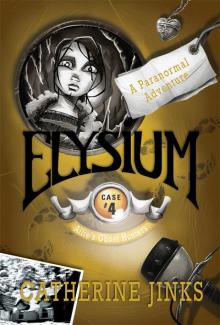 Elysium
Elysium The Reformed Vampire Support Group
The Reformed Vampire Support Group Spinning Around
Spinning Around Pagan's Scribe
Pagan's Scribe Evil Genius
Evil Genius Pagan in Exile
Pagan in Exile Shepherd
Shepherd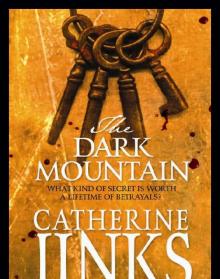 The Dark Mountain
The Dark Mountain How to Catch a Bogle
How to Catch a Bogle Saving Thanehaven
Saving Thanehaven The Genius Wars
The Genius Wars The Abused Werewolf Rescue Group
The Abused Werewolf Rescue Group Theophilus Grey and the Traitor's Mask
Theophilus Grey and the Traitor's Mask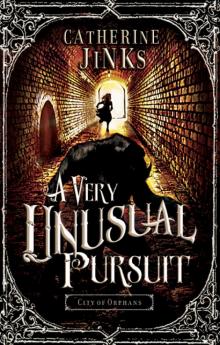 A Very Unusual Pursuit
A Very Unusual Pursuit Genius Squad
Genius Squad Living Hell
Living Hell The Road
The Road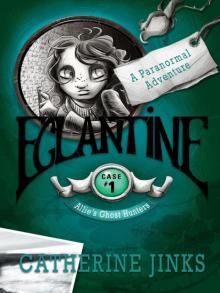 Eglantine
Eglantine